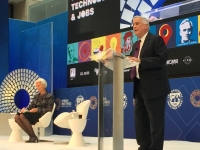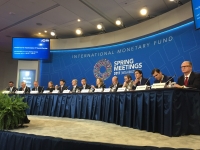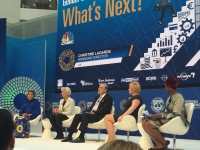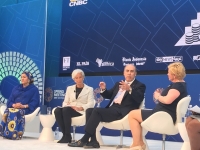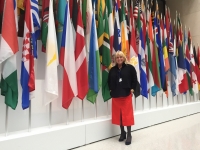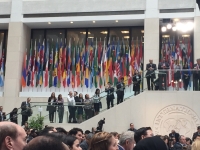Business
SPOTLIGHT INTERNATIONAL MONETARY FUND SPRING 2017
INNOVATION, GENDER GAP, FINTECH
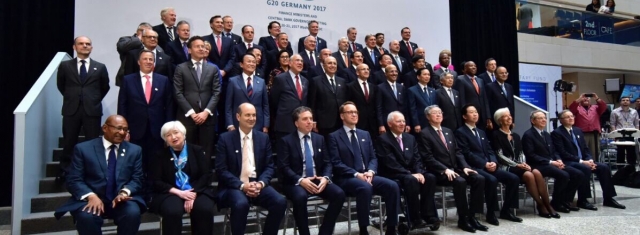
Madame Christine Lagarde, Managing Director of the International Monetary Fund since July 2011, in a conversation with Walter Isaacson, past president and CEO of the Aspen Institute, a nonpartisan educational and policy studies institute based in Washington, DC, he Those who learn to collaborate across disciplines will thrive in the digital economy. Creativity, critical thinking, and the ability to connect science to the arts and humanities will be instrumental to the future of innovation. Rather than viewing humans and technology as locked in a zero sum game, it is more productive to recognize that the great advances of our time have arisen from the collaboration and interface between humans and technology.
“The great innovation of the digital age, of the web, of the internet is that it decentralizes and distributes authority as opposed to handing it from the top down“ said Walter Isaacson, “Coding is not enough, knowing the humanities, knowing history, arts, literature, and creativity“”it´s the connection of the life sciences, the creative arts, and digital technology that will drive future jobs.“
Referring to examples from his recent book, The Innovators: How a Group of Hackers, Geniuses, and Geeks Created the Digital Revolution, Isaacson highlighted that “innovation is a team sport.“ The great advances of the digital revolution“”the microchip, the computer, and the internet“”are products of a collaborative process for which no individual could take credit. “Every great innovation is done in a collaborative way between humans and machines; between teams of people; between teams of people, the government, and academia. That´s one of the things that we´re starting to lose these days“”the notion that innovation is a team sport, that creativity requires collaboration from all sectors.“
Isaacson advocated an overhaul of the U.S. educational system akin to the establishment of the land grant universities, free high school, and the G.I. Bill. He recommended that the U.S. government provide free education from pre kindergarten through grade 14 and acknowledged pre kindergarten through high school education, finance, health care, and genetic engineering as industries ripe for disruption. New technologies could disrupt the nature and provision of financial services, having serious implications for financial stability and regulation.
The FinTech panel discussion focused financial regulation, demand for large universal bank services, financial stability. While some FinTech activities can increase volatility, this does not necessarily jeopardize financial stability, and that FinTech can also provide benefits, such as increased financial inclusion and transparency. “Transparency is the accelerant and the fire for the market. It is the thing that drives people´s transactions. It allows for trust to develop throughout the market and (for persons) to be able to quickly ascertain who owns what and who you are actually dealing with across the table.“ Patrick Murck, Fellow, Harvard Berkman Klein Center.
Artificial Intelligence (AI) and Distributed Ledger Technology (DLT) panelists agreed that AI and DLT technology will bring fundamental changes to financial services provision. AI will transform the way people interact with markets, DLT could have a more significant impact, changing the underlying market structure, including by adding new assets classes. “To get real intelligence about a transaction, you need both the artificial intelligence executing policy, and human intelligence/experience designing the policy.“ Bradley J. Wiskirchen, Chief Executive Officer, Kount. “I would rather that we focus more on underlying structural problems than on the volatility itself“ commented Carolyn A. Wilkins, Senior Deputy Governor, Bank of Canada.
Although the economic benefits of and policies needed to support female economic empowerment are well-known, much remains to be done to deliver meaningful and lasting transformation “Eight men now own as much wealth as the poorest 3.6 billion people. Behind that headline is a story of an economy that does not work for most people, does not work for women“ said Winnie Byanyima, International Executive Director, Oxfam in her Spring 2017 address.
Madame Christine Lagarde, Managing Director, IMF followed up with similarly staggering numbers sharing that 90 percent of countries have legal provisions that discriminate against women, highlighting the need to address this issue in advanced, middle-income, and low-income countries. Rwanda is the most inclusive country in Africa and possibly in the world. Canada and the Nordic countries are also good examples of countries that are putting women´s issues high on the agenda. Statistics show that gender diverse companies are 15 percent more likely to outperform their peers. More women in senior roles of corporations boosts financial performance. Jensen noted that for Norway, if women that current work part time were to work full time, this would cover Norway´s financial gap in 30-40 years. It is important for governments to have policies in place that improve access to higher education, encourage parental leave, and ensure affordable daycare. “You waste a country´s resources by not facilitating for women.“ Siv Jensen, Minister of Finance of Norway.
So which practical measures are needed and considered to close the gender gap? “Women´s issues used to be not regarded as macro critical, now they are. We have actually decided not just to analyze and talk about it, but to walk the talk“ said Lagarde. She disclosed that the Fund has identified policies, including fiscal measures and structural reforms, to help address this issue.
Muhtar Kent, past CEO of the Coca Cola Company, shared Coca Cola´s success in increasing women in leadership positions, including on the Board of Directors, through a multi-year program aimed at reducing barriers for women. Coca Cola has also partnered with governments, civil societies, and NGOs in various countries to create and empower women entrepreneurs. Kent recommended that education incentives for women should be focused on areas where skills gaps exist “Women entrepreneurs in a community strengthen that community. When communities get stronger, our business gets stronger “ said Kent.
Amina Mohammed concluded by praising the United Nations' work in encouraging governments to incentivize the removal of barriers by the private sector and set gender targets for not just countries but also businesses. Because you believe that woman is an asset, you must invest in her to get the return.“ Amina J. Mohammed, Deputy Secretary General, United Nations. My take, summa summarum: Innovation occurs at the intersection between, humans, machines and arts. Transparency and trust will dictate stability in financial transactions. We need to create more job opportunities for women.more information: https://www.ambassadorialrondtable.org

